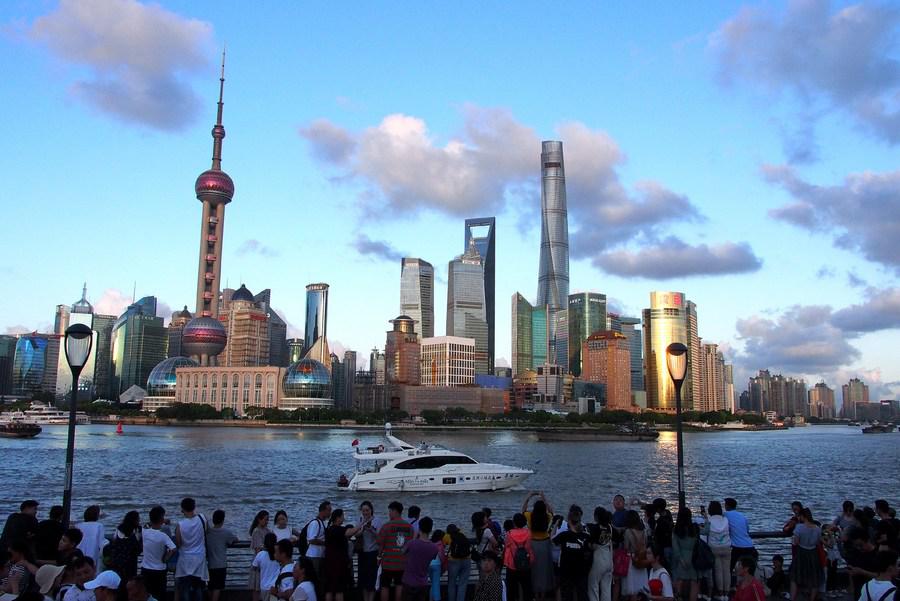China's growth prospects, further opening-up in favor of attracting FDI inflows: OECD expert

People enjoy the view of Lujiazui at the Bund in east China's Shanghai, Aug. 2, 2019. (Xinhua/Chen Fei)
"As China's lockdown was very short in an international comparison and its economy reopened swiftly after gaining control of the outbreak, it became a more realistic destination for FDI than its competitors still under lockdown."
PARIS, May 4 (Xinhua) -- China's favorable growth prospects and further opening-up policies are key factors that attract foreign direct investment (FDI), said an official of the Organization for Economic Cooperation and Development (OECD) on Monday.
FDI inflows to China increased 14 percent last year, making the country the top destination worldwide, noted Margit Molnar, head of the China desk at the OECD Economics Department, in an interview with Xinhua.
Meanwhile, global FDI flows dropped by 38 percent in 2020 to 846 billion U.S. dollars, the lowest level since 2005, according to data released by the Paris-based economic organization on Friday.

Staff members are seen at Bayer HealthCare Company Limited Qidong Branch in Qidong, east China's Jiangsu Province, Dec. 2, 2020. (Xinhua/Zhang Yuwei)
China surpassed the United States as the world's largest FDI recipient last year when the two economies received inflows of 212 billion dollars and 177 billion dollars, respectively.
The OECD attributed the global FDI decrease to the COVID-19 fallout. "COVID-19 created extraordinary circumstances, where lockdowns were not conducive to set up new projects and thus have likely delayed decisions to invest abroad," explained Molnar.
"As China's lockdown was very short in an international comparison and its economy reopened swiftly after gaining control of the outbreak, it became a more realistic destination for FDI than its competitors still under lockdown," she said.
China's increased opening was another important factor in attracting FDI, she added.

Photo taken on July 3, 2020 shows the research center of the Chinese e-commerce giant Alibaba on the "AIsland" of Zhangjiang Science City in Pudong New Area, east China's Shanghai. (Xinhua/Fang Zhe)
"According to the OECD's FDI Regulatory Restrictiveness Index, from 2019 to 2020, China reduced barriers to FDI, most visibly in financial services but regulations also eased in manufacturing, agriculture and construction," she noted.
The economist stressed that stabilizing foreign investment inflows is an important policy target, as it is key to technological upgrading and ultimately to long-term growth.
"China has leapfrogged ahead of many advanced economies in newly emerging areas such as e-commerce or AI, but needs to continue its technology upgrading in other areas, including traditional and manufacturing industries," she said.
China is also becoming a major international investor and "its share of overall outward FDI stock has been increasing rapidly," Molnar said.
China has continued to invest at high rates, with its outward FDI flows reaching 16 percent of global flows last year, up from 12 percent in 2019, the expert noted.
Photos
Related Stories
- Interview: Ghana poised to be priority destination for Chinese investment: trade analyst
- China continues to attract foreign investors with soaring Q1 FDI
- China's Q1 FDI inflow soars nearly 40 pct
- China becomes largest destination for FDI
- As largest FDI recipient, China improves business climate for investors
- China's FDI bucks trend in 2020
- China’s FDI bullish amidst headwinds
- Foreign firms continuing to invest in China amid pandemic: U.S. media
- China overtakes U.S. as world's top destination for FDI in 2020: BBC
- China largest FDI recipient in 2020 followed by US, UNCTAD report says
Copyright © 2021 People's Daily Online. All Rights Reserved.










